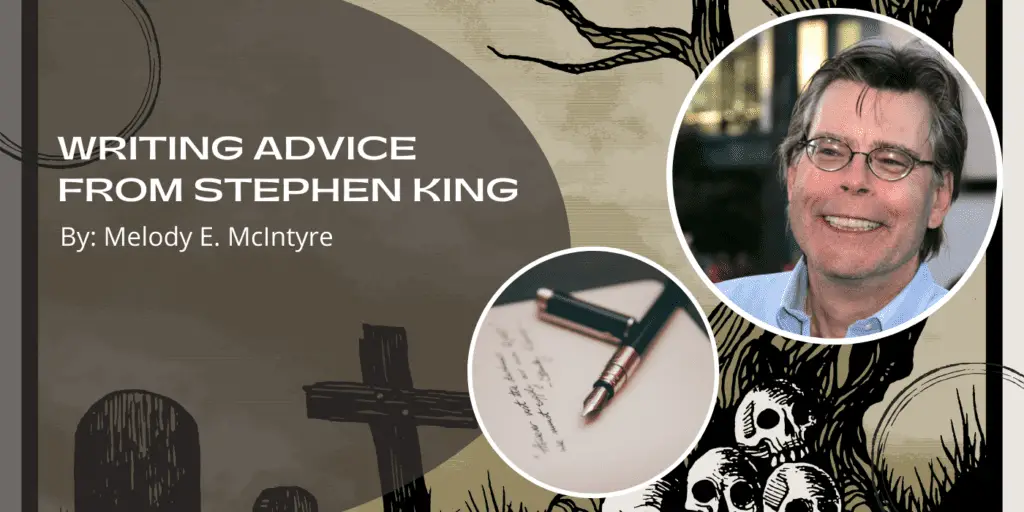Writing Advice from Stephen King

Stephen King is one of the most prolific and successful writers of the modern world. How did he get that way? What makes Stephen King’s work so enjoyable? How can we, as growing writers, emulate him? Luckily for us, Stephen King has long been open about his writing process and the lessons he’s learned over his lengthy career. The best way to learn about King’s process is to pick up a copy of On Writing: A Memoir of the Craft. But here I’m going to look at eight pieces of writing advice from Stephen King that resonated with me.
- Read a Lot and Write a Lot
“If you want to be a writer, you must do two things above all others: read a lot and write a lot.” – Stephen King in On Writing: A Memoir of the Craft
It baffles me when I see people talk about becoming a writer without doing any reading. Reading is an excellent way to learn and we gain as much from books we don’t enjoy as those we do. Even when reading simply for pleasure, our brains are absorbing and analyzing the words and story as we go. But reading other people’s work isn’t enough on its own. To be a writer, we must produce our own words. Not just because that is the definition of “writer” but by putting words on the page, it’s the only way we can grow and develop.
- Write Every Day
Stephen King’s typical routine is to write for four hours straight every single day. Sure, he does take the odd day off, but for the most part he writes daily. It works for him. Writing every single day will not work for every writer – it doesn’t work for me, but it is important to have a regular writing schedule of some sort. Much like exercise, writing buildings on itself, and keeping to a regular schedule and word count is key.
- Avoid distraction while writing
“Wherever you write is supposed to be a little bit of a refuge, a place where you can get away from the world.” – Stephen King in The Paris Review Issue 178, Fall 2006
King describes writing as “self-hypnosis”. You need to immerse yourself in your writing to let the words flow. It’s easy to get distracted by the internet, your family, work, or my cat who loves to paw at my elbow when I work. Learning to shut out these distractions, or to find the right balance is key to the process. For example, I have trouble focusing without background noise and will often play music as I write.
- If you don’t succeed, get a bigger nail
When King started submitting, he hammered a nail into his wall and stuck every rejection slip onto it. Eventually the nail buckled under the weight and King had to replace the nail. That is a lot of rejection, but instead of letting it stop him, he used it to grow and become a better writer. Rejection is part of the process; it can’t be avoided. It can hurt and be hard to face, but as writers we need to find a bigger nail and persevere.
King uses this piece of his life when he writes Harold in The Stand. Harold has a rejection nail, but instead of embracing the learning experience of rejection, Harold internalizes it to a dangerous degree with disastrous results.
- Listen to the Critics
It’s hard to build on rejection if you don’t know why your work is being rejected. Critics and reviews should be approached with caution, but King advises listening to them, too. They can help you see your writing flaws and learn how to change what needs to be changed, and to let go of what isn’t working.
- Kill your Darlings
“Kill your darlings, kill your darlings, even when it breaks your egocentric little scribbler’s heart, kill your darlings.” – Stephen King in On Writing: A Memoir of the Craft
This phrase did not originate with King and has been attributed to many writers, but what does it mean exactly? It does not mean kill your favourite characters, but to edit out the parts of your story that you may live, but don’t serve the overall narrative. Don’t be afraid to combine characters, drop that fancy-sounding, but meaningless sentence, and essentially to get out of your own head. Focus on what makes the story the best it can be.
- Follow where the story goes
When Stephen King started ’Salem’s Lot, he did not intend it to be a dark tale. He wanted it to be the opposite of Dracula, where the good guys win, but that didn’t happen. Stephen King is a “discovery writer” or “pantser”, which means that when he writes his stories, he doesn’t have a detailed outline to work from. He “flies by the seat of his pants”. The opposite of that are the “plotters”, who meticulously outline everything before they write. Most of us probably fall somewhere in between or shift over time. Even if you are an outliner, this advice can still fit. Story and characters have natural progressions and when writers fight too hard against that, it can lead to awkward, hollow writing where things just feel “off”.
- Remember why you write
When asked if he writes for the money, King said “The answer is no. Don’t now and never did … I have written because it fulfilled me.” – Stephen King in On Writing: A Memoir of the Craft
There is nothing wrong with getting paid for your writing or wanting to get paid for it, but if that is your only motivation, it likely won’t be enough to carry you through the rejection or to hammer in the second nail. So when the failures outweigh the successes, and you are struggling, look back to why you wanted to write in the first place and hold onto that.
“Writing is not life, but I think that sometimes it can be a way back to life.” – Stephen King in On Writing: A Memoir of the Craft
Sources:
10 Writing Tips from Stephen King by Outstanding Screenplays
https://www.youtube.com/watch?v=B6SKj_eiY9k
10 Bits of Writing Advice from Stephen King https://www.writerswrite.co.za/10-bits-of-writing-advice-from-stephen-king/
What does it mean to kill your darlings?
https://www.masterclass.com/articles/what-does-it-mean-to-kill-your-darlings
Famous Writing Routines
https://famouswritingroutines.com/writing-routines/stephen-king-writing-routine/
- About the Author
- Latest Posts
Melody lives in Ontario, Canada and writes short, dark fiction. She has been published in several anthologies and online publications. In university, she studied Ancient Greek and Roman Studies and often infuses her work with elements of Greek mythology. She also loves reading, embroidery, and martial arts. You can follow her homepage at: https://www.blog.melodyemcintyre.com/
Homepage: https://www.blog.melodyemcintyre.com/MelodyEMcintyre.com
Twitter: @evamarie41.













